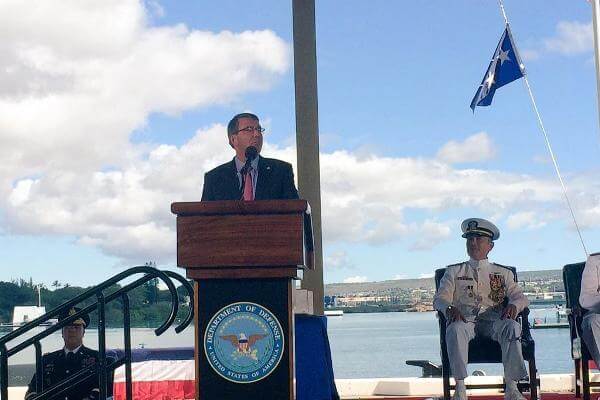Defense Secretary Ashton Carter presided Wednesday at a long-delayed ceremony at Pearl Harbor to install Adm. Harry Harris as the new commander of the U.S. Pacific Command - the combatant command charged with countering China's aggressive actions in disputed territorial waters.
Following the change of command ceremony, Carter was headed to meetings with Pacific region defense ministers in Singapore at the so-called Shangri-La Dialogue, named for the venue of the talks at the five-star Shangri-La Hotel.
Harris was nominated last September by President Obama and confirmed by the Senate in December to replace Samuel Adm. Samuel J. Locklear, III, as PaCom commander, but the change of command was held up by the Navy's "Fat Leonard" corruption scandal and speculation that Locklear might be named the next Joint Chief Chairman.
The Justice Department and then a Navy review board headed by Adm. John Richardson subsequently cleared Locklear of involvement with Glenn Defense Marine Asia (GDMA) and its chief executive, Leonard Glenn "Fat Leonard" Francis.
The action allowed Locklear to begin the process of retiring and triggered major changes in the senior ranks of the services. Obama quickly nominated Marine Commandant Gen. Joseph Dunford to replace Gen. Martin Dempsey as chairman of the Joint Chiefs of Staff.
Richardson was named to replace Adm. Jonathan Greenert as the next chief of naval operations, and Gen. Mark Milley was chosen to succeed Gen. Ray Odierno as the Army's Chief of Staff. With Harris succeeding Locklear, Adm. Scott Swift will replace Harris as Pacific Fleet commander.
Harris, 59, the first Asian-American to achieve four-star rank in the Navy, has already made clear his intention to be plain-spoken in a command that includes 370,000 service and civilian personnel and covers half the Earth's surface. Harris was born in Japan to a Japanese mother and a Navy enlisted father.
Harris has charged that China was building a "great wall of sand" in the South China Sea through dredging to create artificial islands on disputed reefs. On Tuesday, the Chinese news agency Xinhua reported that a ground-breaking ceremony was held on two of the reefs for the installation of lighthouses.
In an interview Monday with Time magazine, Harris cited a list of Chinese aggressive actions "like unilaterally declaring an air-defense identification zone over the East China Sea, parking a mobile oil platform off the Vietnam coast, and their lack of clarity on their outrageous claim -- preposterous claim, really -- to 90 percent of the South China Sea."
Harris is a graduate of the U.S. Naval Academy and did post-graduate work at Harvard, Georgetown and Oxford. He spent much of his career as a naval flight officer aboard P-3 Orion patrol planes.
Locklear said he was retiring after 43 years of service as the Navy's "Old Salt" - meaning the oldest serving surface warfare officer in the Navy.
In his remarks, Carter credited Locklear with beginning the key Obama administration initiative of rebalancing U.S. forces to the Asia-Pacific region.
Continuing the rebalance and developing security partnerships with Asian allies will be the main focus of the Singapore talks with defense ministers, formally known as the Asia Security Summit, Carter said. The 10-day Asia swing will also take Carter to Vietnam and India.
-- Richard Sisk can be reached at Richard.Sisk@military.com






























